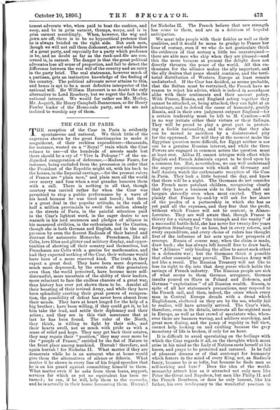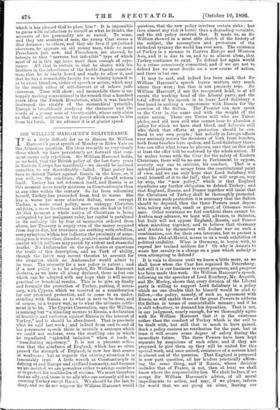THE CZAR IN PARIS.
THE reception of the Czar in Paris is evidently spontaneous and national. We think little of the eagerness shown by the great functionaries to make it magnificent, of their reckless expenditure—thousands, for instance, wasted on a " Royal " train which the Czar refuses to use—of the hundreds of arrests made lest there should be a cry of " Vive la Pologne ! " of the un- dignified exaggeration of deference,—Madame Faure, for instance, being excluded from the procession in order that the President of the Republic might sit, with his back to the horses, in the Imperial carriage,—for the present rulers of France are " plain men," and plain men all the world over scurry and fuss when a real grandee honours them with a call. There is nothing in all that, though courtesy was carried rather far when the Czar was permitted to stop a public performance by a wave of his hand because he was tired and bored ; but there is a great deal in the popular attitude, in the rush of half a million provincials to swell the million already in the streets of Paris, in the painful attention paid to the Czar's lightest word, in the eager desire to see warmth in his iced sentences and pledges of alliance in his measured civilities, in the enthusiasm for the Czarina, though she is both German and English, and in the sup- pression by even the fiercest Radicals of their hatred and distrust for autocratic Monarchs. Frenchmen, like all Celts, love fetes and glitter and military display, and oppor- tunities of showing off their country and themselves, but Frenchmen are Celts with a genius for mathematics, and had they expected nothing of the Czar, their welcome would have been of a more reserved kind. The truth is, they expect a great deal. They have been more depressed, much more depressed, by the events of this generation even than the world perceived, have become more self- distrustful, more uncertain of the ability of their leaders, more reluctant to face the endless chances of a great war, than history has ever yet shown them to be. Amidst all their boasting of their revived Army, and while they have been splendidly exerting their great powers of recupera- tion, the possibility of defeat has never been absent from their minds. They have at heart longed for the help of a big brother ; have been willing, if they could get it, to let him take the lead, and settle their diplomacy and their action ; and they see in this visit assurance that at last he has been found. The ruler of the North, they think, is willing to fight by their side, and their hearts swell, not so much with pride as with a sense of relief and hope. They may get back their estates, they may regain their " position," they may once more be the " people of France," entitled by the fiat of Nature to the front place among mankind. Hurrah ! therefore, and again hurrah ! for Nicholas II. What matter if they are democrats while he is an autocrat who at home would give them the alternatives of silence or Siberia. What matter if he shows in every line of his frigid speeches that he is on his guard against committing himself to them. What matter even if he asks from them loans, support, services for which as yet no equivalent has been re- turned ; he can, if he will, help them to the revanche, and he is actually in their house honouring them. Hurrah ! for Nicholas II. The French believe that new strength has come to them, and are in a delirium of hopeful anticipation.
We must take people with their foibles as well as their qualities, and it would be mean to grudge to France her hour of ecstasy, even if we who do not gesticulate think the evidences of that ecstasy a little too unrestrained— there are able men who skip when they are pleased—and this the more because at present the delight does not directly threaten the peace of the world. All this en- thusiasm for the alliance makes the ally important, and the ally desires that peace should continue, and the terri- torial distribution of Western Europe at least remain undisturbed. If the Czar has decided, as seems probable, that the Sultan must be restrained, the French have no reason to reject his advice, which is indeed in accordance alike with their sentiments and their ancient policy. With France, Russia, and England acting together they cannot be attacked, or, being attacked, they can fight at an advantage, and to defend the cause of humanity, gratify Russia, and in their own judgment outpace England—for a certain leadership must be left to M. Cambon—will in no way irritate either their virtues or their failings. They will be proud to play a great part in protect- ing a feeble nationality, and to show that they also can be moved to sacrifices by a disinterested pity for the oppressed. Nor will they at the moment make the Egyptian question more difficult, for Egypt neither is nor can be a genuine Russian interest, and while the three Powers are engaged in common action the question must at least rest. Abbas II. cannot intrigue with effect while English and French Admirals expect to be fired upon by a common foe. But, nevertheless, we can well understand the angry suspiciousness with which all Germany and half Austria watch the enthusiastic reception of the Czar in Paris. They look a little beyond the day, and know that there will be a night. The Germans do not consider the French mere petulant children, recognising clearly that they have a business side to their heads, and can bargain shrewdly even when most excited. They see plainly that France by-and-by will ask for her share of the profits of a partnership in which she has as yet paid all the expenses, and they fear that the profit, without which France will not be content, is Alsace- Lorraine. They are well aware that, though France is thirsty for a victory and " the triumph and the vanity " of a successful battle-field, she has never for twenty-five years forgotten Strasburg for an hour, but in every reform, and every expenditure, and every choice of rulers has thought first of the influence of her acts upon her prospects of revenge. Russia of course may, when the claim is made, draw back ; she has always left herself free to draw back, the " Alliance " only binding the allies to assist each other in a defensive war ; but the Germans think it possible that other counsels may prevail. The Russian Army will not like a recoil. The Russian Treasury will not like to lose its right to dip into that deep purse which holds the savings of French industry. The Russian people are sick of what seems to them German arrogance, German insults poured on Slays in Poland and Bohemia, and German " exploitation " of all Russian wealth. Russia, in spite of all her statesmen's precautions, may respond to the French call, and then, indeed, the crisis which every man in Central Europe dreads with a dread which Englishmen, sheltered as they are by the sea, wholly fail to realise, will have actually arrived. The Czar's visit, therefore, even in its details, interests all far-sighted men in Europe, as well as that crowd of spectators who, when- ever there are banners waving, and soldiers marching, and great men dining, and the pomp of regality in full view, cannot help looking on and exulting because the grey monotony of life is broken, if only for an hour.
It is difficult to avoid speculating on the feelings with which the Czar regards it all, on the thoughts which must arise in his mind as the Lady of Nations casts herself at his knees, and prays to be protected and caressed. Is he full of pleasant dreams or of that contempt for humanity which festers in the mind of every King, not, as Radicals fancy, because he is so lofty, but because he finds men so self-seeking and base ? Does the idea of the world- monarchy attract him as it attracted not only men like Peter the Great and Napoleon, but men like Philip II. and• the French Bourbons, or does he only lament, like his father, his own inadequacy to the wonderful position. in which it has pleased God to place him ? It is impossible to guess with satisfaction to oneself at what he thinks, the accounts of his personality are so varied. To some, and they are students of men, the young Czar seems a Slav dreamer; to others, and they are keen if prejudiced observers, he appears an old young man, while to most Frenchmen just now, and Frenchmen are shrewd, he belongs to that " nervous but inflexible " type of which most of us in this age have more than enough of expe- rience. All that is certain is that he shares with his brothers in the inheritance of the feeble Danish constitu- tion, that he is easily bored and ready to allow it, and that he has a remarkable faculty for so reining himself in as to avoid blunders, either of speech or action, which may be the result either of self-distrust or of inborn judi- ciousness. Time will show ; and meanwhile there is un- happily nothing conventional in the remark that a hundred years after the French Revolution, which it was fancied destroyed the vitality of the monarchical principle, Europe is breathlessly studying the character and the words of a young man of twenty-eight, whose only claim to that awed attention is the power which comes to him from his birth. If we advance it is at glacier speed.



















































 Previous page
Previous page